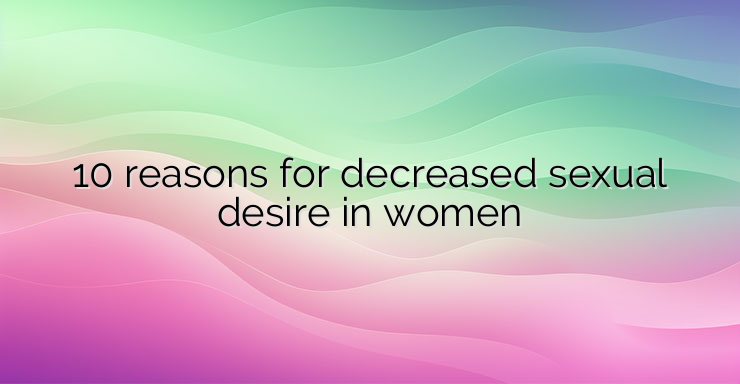Every woman has different sexual activity and sexual desire, but every woman has experienced at some point in her life that her desire for intimacy has been reduced or absent altogether. But when does a lack of sexual desire become a problem? The term hypoactive sexual desire disorder refers to a condition in which there is low or even no sexual activity for a period of at least six months. The disorder of sexual desire is manifested by lack of initiative and desire for intimate contacts with the partner, lack of sexual fantasies, lack of pleasure from sexual contact. When this problem covers a longer period of time and leads to problems in the relationship with the partner, you need to seek medical help and find the reason for your low sexual desire. The reasons for low libido can be quite diverse. Here are ten of the most common among them: 1. Depression – depression is a serious problem in which, along with low libido, a number of other symptoms are observed: increased or decreased appetite, sleepiness or insomnia, feelings of despair and helplessness, chronic fatigue, suicidal thoughts etc. Self-esteem and perception issues can also create a barrier in sexual relationships. 2. Problems in the relationship – the lack of free communication between the partners; long relationships that lead to emotional distancing; lack of trust can be causes of decreased sexual desire. 3. Busy everyday life – workload at work, insomnia, fatigue normally lower libido. The support of the partner in such cases is of particular importance. 4. Existence of a sexual problem – sometimes the lack of sexual desire can be caused by difficulties and impossibility of experiencing orgasm, in case of vaginismus. Vaginismus is an involuntary contraction of the muscles of the pelvic floor, which makes sexual intercourse impossible and very painful. Sexual harassment in the past can also be a serious reason for a lack of sexual desire. 5. Menopause – this period of every woman’s life is characterized by the absence of menstruation for a period of at least one year due to a sharp drop in estrogen levels. Low estrogen levels are also the cause of low libido among menopausal women, as they lead to vaginal dryness and make intercourse painful and difficult. 6. Pregnancy and breastfeeding – these periods are associated with changes in hormonal levels, which also affects sex life. After giving birth, estrogen levels drop sharply, which can also be a cause of postpartum depression in some women. Low estrogens in this case lead to low libido. 7. Side effect of taking some drugs – among the drugs that lower sexual desire are a large number of antidepressants, antiepileptics, antipsychotics, beta-blockers, contraceptives.Before taking any medication, it is advisable to get more information about the side effects and unwanted effects of therapy from your doctor. 8. Hypothyroidism – hypofunction of the thyroid gland, in which not enough thyroid hormones are produced, which leads to fatigue, depression, increased appetite, constipation, hair loss and decreased libido. Hormone replacement therapy with thyroxine may improve the condition. 9. Cardiovascular problems – chronic diseases of the cardiovascular system such as arterial hypertension, ischemic heart disease, etc., the therapy of which requires taking antihypertensive drugs and not only that, also lead to a change and decrease in sexual desire. A reason for a change in libido can be the stress of having a similar condition or an unwanted effect of therapy. 10. Alcohol and smoking – small amounts of alcohol can increase sexual desire, but long-term and frequent use of alcohol and tobacco products leads to a decrease in libido. Decreased sex drive for a longer period of time can be a signal of a health problem, so it should not be ignored and an underlying cause should be found.


Leave a Reply